八上 Unit 7 Will people have robots
unit-7-Will-people-have-robots知识点总结(推荐文档)
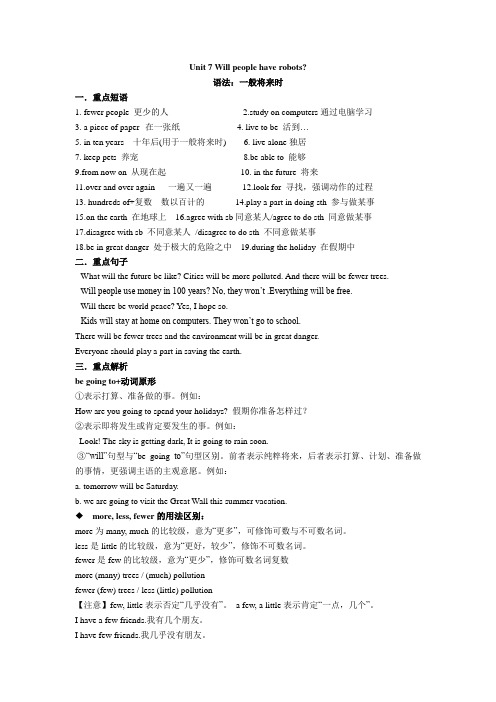
Unit 7 Will people have robots?语法:一般将来时一.重点短语1. fewer people 更少的人2.study on computers通过电脑学习3. a piece of paper 在一张纸4. live to be 活到…5. in ten years 十年后(用于一般将来时)6. live alone独居7. keep pets 养宠8.be able to 能够9.from now on 从现在起10. in the future 将来11.over and over again 一遍又一遍12.look for 寻找,强调动作的过程13. hundreds of+复数数以百计的14.play a part in doing sth 参与做某事15.on the earth 在地球上16.agree with sb同意某人/agree to do sth 同意做某事17.disagree with sb 不同意某人/disagree to do sth 不同意做某事18.be in great danger 处于极大的危险之中19.during the holiday 在假期中二.重点句子--What will the future be like? Cities will be more polluted. And there will be fewer trees.--W ill people use money in 100 years? No, they won’t .Everything will be free.--Will there be world peace? Yes, I hope so.--Kids will stay at home on computers. They won’t go to school.There will be fewer trees and the environment will be in great danger.Everyone should play a part in saving the earth.三.重点解析be going to+动词原形①表示打算、准备做的事。
Unit7Willpeoplehaverobots重点速记语法精讲写作指导阅读提升英语八年级上册(人
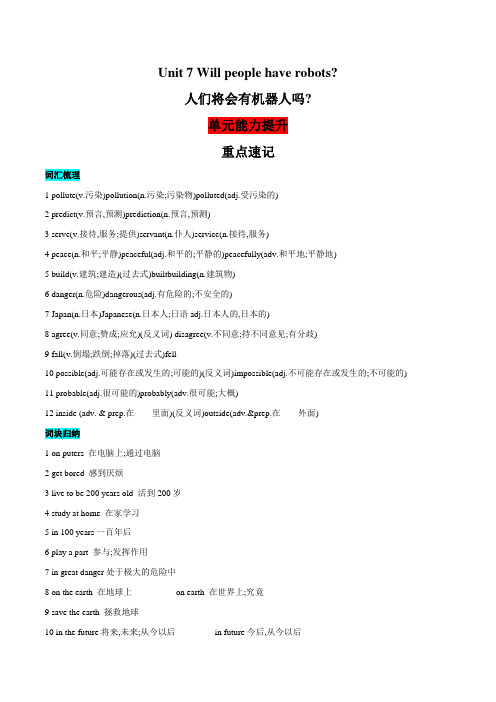
Unit 7 Will people have robots?人们将会有机器人吗?单元能力提升重点速记词汇梳理1 pollute(v.污染)pollution(n.污染;污染物)polluted(adj.受污染的)2 predict(v.预言,预测)prediction(n.预言,预测)3 serve(v.接待,服务;提供)servant(n.仆人)service(n.接待,服务)4 peace(n.和平;平静)peaceful(adj.和平的;平静的)peacefully(adv.和平地;平静地)5 build(v.建筑;建造)(过去式)builtbuilding(n.建筑物)6 danger(n.危险)dangerous(adj.有危险的;不安全的)7 Japan(n.日本)Japanese(n.日本人;日语adj.日本人的,日本的)8 agree(v.同意;赞成;应允)(反义词) disagree(v.不同意;持不同意见;有分歧)9 fall(v.倒塌;跌倒;掉落)(过去式)fell10 possible(adj.可能存在或发生的;可能的)(反义词)impossible(adj.不可能存在或发生的;不可能的)11 probable(adj.很可能的)probably(adv.很可能;大概)12 inside (adv. & prep.在······里面)(反义词)outside(adv.&prep.在······外面)词块归纳1 on puters 在电脑上;通过电脑2 get bored 感到厌烦3 live to be 200 years old 活到200岁4 study at home 在家学习5 in 100 years一百年后6 play a part 参与;发挥作用7 in great danger处于极大的危险中8 on the earth 在地球上on earth 在世界上;究竟9 save the earth 拯救地球10 in the future将来,未来;从今以后in future今后,从今以后11 fresh water淡水12 over and over again 多次;反复地13 look like 看起来像14 look for 寻找;寻求15 wake up 醒来;叫醒16 hundreds of 许多;大量17 fall down 突然倒下;跌倒;倒塌18 take/have a holiday 度假19 move to other planets 搬到其他行星上去20 plant more trees 种更多的树21 do simple jobs 做简单的工作用法总结1 play a part in doing sth.在做某事中起作用2 fewer+可数名词复数更少的······more+可数名词复数/不可数名词更多的·······less+不可数名词更少的·······3 have to do sth.不得不做某事4 There be sb./sth. doing sth.有某人/某物正在做某事.5 make sb. do sth.让某人做某事6 What will…be like?······将会是什么样子?7 agree/disagree with sb.同意/不同意某人(的观点)语法精讲语法示例1.Kids won't go to school.孩子们将不会去上学.(教材P49图片文字)2.Will people use money in 100 years?100年后人们还会使用钱吗?(教材P49 1c)3.Will there be world peace? 世界将会和平吗?(教材P51Grammar Focus)4.I will be an astronaut.我将成为一名宇航员.(教材P52 1d)语法概述一般将来时既可表示将来某个时间要发生的动作或存在的状态,也可表示将来经常或反复发生的动作.其基本结构主要有"be going动词原形"和to+动词"will+动词原形",本单元主要讲的是will型一般将来时.will 本身没有人称和数的变化,常缩写为’ll.其否定形式为will not,常缩写为won't.特别提醒主语为I或we时,也可用"shall+动词原形"表示一般将来时.shall not 常缩写为shan't.Shall we have the meeting?我们要开会吗?No, we shan't.不,我们不开.考向2一般将来时的用法"will+动词原形"常与表示将来的时间状语连用,如tomorrow、the day after tomorrow、next year、in the future等.»My mum hopes that I will be happy and healthy in the future.我妈妈希望我将来开心、健康.特别提醒will也可表示“愿意”.»They won't lend us any more money.他们不愿再借给我们钱了.拓表示位置移动的动词,如go、leave、start、e、arrive等,可用现在进行时表示按计划或安排将要发生的动作.»My father is ing to see me.我父亲就要来看我了.»We're leaving for Beijing.我们要动身去北京.典例1(2022·青海中考)Hurry up! The plane________ in one and a half hours.Don't worry. I will drive you to the airport immediately.A. will take offB. takes offC. took off解析:句意:"快点儿!飞机将在一个半小时后起飞.""别着急.我马上开车送你去机场."根据时间状语"in one and a half hours"可知,此处时态为一般将来时,故选A.考向3 there be 句型的一般将来时结构there be句型的一般将来时结构有两种,即:there will bethere is/are going to be(1)其否定形式是在will或is/are后直接加not;(2)其一般疑问句形式是直接把will或is/are提到句首;(3)肯定回答为"Yes, there will."或"Yes, there is/are.";否定回答为"No, there won't."或"No, there isn't/aren't.".»There will be a party in my house this Friday.=There is going to be a party in my house this Friday.这周五我家将有一场聚会.»There won't be more pollution in the future.将来不会有更多污染.»Will there be fewer trees?将会有更少的树吗?No, there won't.不,不会.»Is there going to be no paper money?将会没有纸币吗?No, there isn't.不,不会.典例2 (2022·丹东中考)Next year,_______ a new road leading to the village.A. there isB. there areC. there will beD. there was解析:句意:明年,将有一条新的路通向这个村庄.next year"明年"是表示将来的时间状语,故此处应用一般将来时,选C.考向4"be going to+动词原形"与"will+动词原形"的区别① be going to 含有"计划;准备"的意思,而will则没有这个意思.»She is going to lend us her book. 她打算把她的书借给我们.②"be going to+动词原形"表示根据目前迹象推断将要发生的事情;"will+动词原形"表示说话人认为、希望、相信或假定要发生的事情.»Listen to the wind. We are going to have a rough crossing.听那风声,我们渡海时风浪一定很大.»He is in hospital and he will get better.他住院了,他会好起来的.③ be going to 可以用在条件状语从句中表示将来,而will不能.»If you are going to attend the meeting, you'd better leave now.如果你打算参加会议,最好现在就动身.特别提醒will表示"意愿,坚持,拒绝"等时,可用于条件句中.»If you will listen to me, I'll give you some advice.如果你愿意听我的,我就给你提些建议.巧学妙记一般将来时的用法将来可能事,will加动原;shall限主语,l/we在前面.计划已做好,迹象在眼前;口语经常见,be going to 加动原.写作指导如何写预测未来的相关文章话题分析本单元的话题是预测未来,是中考常考的一个话题.预测未来的话题常有关环境、机器人、交通工具、工作和生活等.此类文章通常用一般将来时.写作实践(盐城中考)学校将举办英语写作比赛.请根据所给提示,以"My life in 20 years"为题,写一篇参赛短文,分享你对未来的憧憬.注意事项:1.词数:100左右(文章开头已给出,不计入总词数);2.文中不能出现真实姓名、校名等信息;3.文章必须包含所提供的主要信息,并作适当发挥.My life in 20 yearsI'm always working hard for a bright future. I imagine_________________________________________________________________________________________________________________________________________ ____________________________________________________________________________________________ ____________________________________________________________________________________________ ____________________________________________________________________________________________ ____________________________________________________________________________________________ ____________________________________________________________________________________________ ____________________________________________________________________________________________ 思路导引开篇点题I'm always...a bright future.I imagine my life in 20 years.详细描述Family: take good care of my parents, spend more time staying with themFriends: get together, talk about the past school life, travel aroundJob: work much harder, take on more new challenges, try my best表明决心I will work harder to make it e true.词句积累佳作展示My life in 20 yearsI'm always working hard for a bright future. I imagine my life in 20 years.I love my family, so I will take good care of my parents.① I will spend more time staying with them because I'll have more free time.② Besides my family, I will also get together with my friends more often. We will talk about the past school life and travel around together.As for my job, I'm going to be a reporter.③ I think I will work much harder and take on more new challenges.④I will try my best to do every task well.I think my life in 20 years will be exciting and wonderful. And I will work harder to make it e true.名师点评本文层次分明、内容清晰完整,一般将来时运用准确.take good care of、as for、take on、e true等短语的运用,也是本文的亮点.①句是含有because引导的原因状语从句的复合句,并运用了spend some time doing sth.结构,丰富了文章的句式结构.②使用besides自然地引出了和朋友相处的话题.③句是含有省略了引导词that的宾语从句的复合句,work much harder 和take on more new challenges 展现了作者努力工作的态度.④句运用了try one's best to do sth.结构,增加了文章的亮点.阅读提升方法概述细节理解题在阅读理解中占的比重非常大,这类题主要针对时间、地点、人物、事件、方式、结果等进行考查,实际是对文中某个词语、某个句子或某个段落的细节进行设题,一般可直接在文中找到答案.所以答题时,要将题干所涉及的信息在原文中找出来,把相关信息仔细读一遍,比较所给选项与文中细节的区别,排除干扰项,从而确定答案.对相关细节进行理解时,要抓住题干中涉及的时间、地点、人物等有提示作用的信息.中考链接(2022·淮安中考)Once a rich businessman gave his daughter a beautiful necklace. But later the necklace for the girl went missing. The businessman offered a reward of $50,000 for anyone who could find it.One day Robin was walking home along a dirty river. He saw something shining in the river. It was the diamond necklace! He decided to catch it so that he could get the reward.He put his hand in the dirty river and tried to catch the necklace, but somehow missed it.He tried again. This time he walked into the river and put his whole arm in to catch the necklace. But strangely, he still missed it!He came out and started walking away. Then again he saw the necklace, right there. He decided to give it a final try.He jumped into the dirty water and searched everywhere for the necklace but still he failed. He came out feeling very sad.Just then an old man, who was walking by, saw him and asked what was wrong. At first Robin did not want to share the secret with the old man. But finally he decided to tell the truth.30.Robin decided to catch the necklace in the river to________..A. sell it for money B. get the reward C. help the businessman D. marry the girl方法指导根据"He decided to catch it so that he could get the reward"可知,Robin 决定抓住项链是为了得到奖赏.故选B.。
人教版八年级上Unit7 汉语翻译
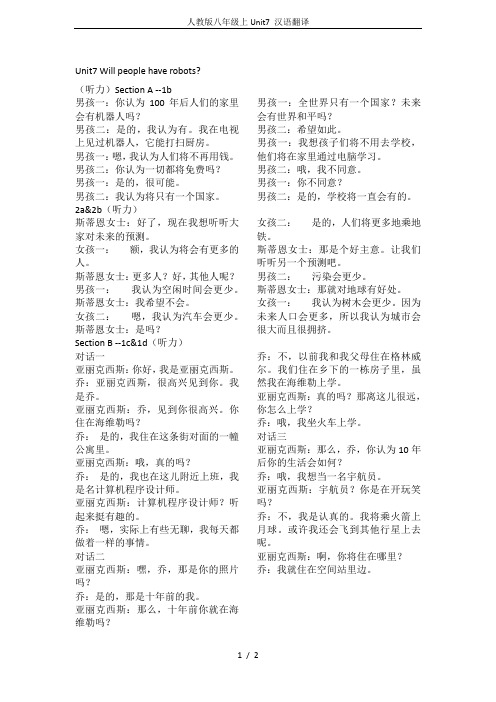
人教版八年级上Unit7 汉语翻译Unit7 Will people have robots?(听力)Section A --1b男孩一:你认为100年后人们的家里会有机器人吗?男孩二:是的,我认为有。
我在电视上见过机器人,它能打扫厨房。
男孩一:嗯,我认为人们将不再用钱。
男孩二:你认为一切都将免费吗?男孩一:是的,很可能。
男孩二:我认为将只有一个国家。
男孩一:全世界只有一个国家?未来会有世界和平吗?男孩二:希望如此。
男孩一:我想孩子们将不用去学校,他们将在家里通过电脑学习。
男孩二:哦,我不同意。
男孩一:你不同意?男孩二:是的,学校将一直会有的。
2a&2b(听力)斯蒂恩女士:好了,现在我想听听大家对未来的预测。
女孩一:额,我认为将会有更多的人。
斯蒂恩女士:更多人?好,其他人呢?男孩一:我认为空闲时间会更少。
斯蒂恩女士:我希望不会。
女孩二:嗯,我认为汽车会更少。
斯蒂恩女士:是吗?女孩二:是的,人们将更多地乘地铁。
斯蒂恩女士:那是个好主意。
让我们听听另一个预测吧。
男孩二:污染会更少。
斯蒂恩女士:那就对地球有好处。
女孩一:我认为树木会更少。
因为未来人口会更多,所以我认为城市会很大而且很拥挤。
Section B --1c&1d(听力)对话一亚丽克西斯:你好,我是亚丽克西斯。
乔:亚丽克西斯,很高兴见到你。
我是乔。
亚丽克西斯:乔,见到你很高兴。
你住在海维勒吗?乔:是的,我住在这条街对面的一幢公寓里。
亚丽克西斯:哦,真的吗?乔:是的,我也在这儿附近上班,我是名计算机程序设计师。
亚丽克西斯:计算机程序设计师?听起来挺有趣的。
乔:嗯,实际上有些无聊,我每天都做着一样的事情。
对话二亚丽克西斯:嘿,乔,那是你的照片吗?乔:是的,那是十年前的我。
亚丽克西斯:那么,十年前你就在海维勒吗?乔:不,以前我和我父母住在格林威尔。
我们住在乡下的一栋房子里,虽然我在海维勒上学。
亚丽克西斯:真的吗?那离这儿很远,你怎么上学?乔:哦,我坐火车上学。
八年级英语上册Unit7Willpeoplehaverobots知识点归纳(新版)
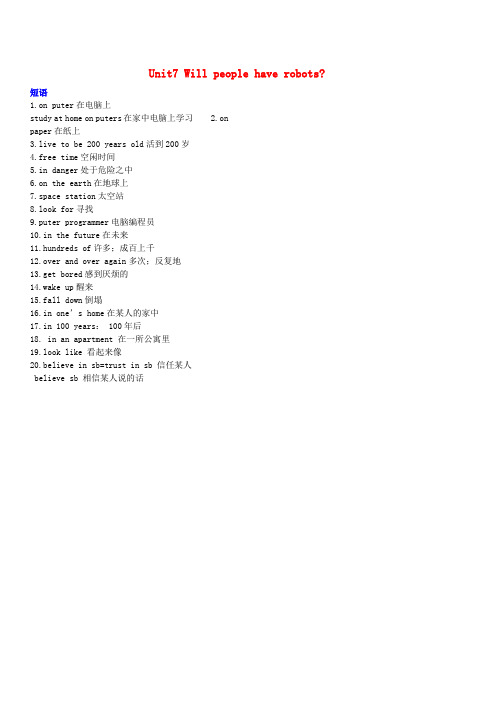
Unit7 Will people have robots?短语1.on puter在电脑上study at home on puters在家中电脑上学习 2.onpaper在纸上3.live to be 200 years old活到200岁4.free time空闲时间5.in danger处于危险之中6.on the earth在地球上7.space station太空站8.look for寻找9.puter programmer电脑编程员10.in the future在未来11.hundreds of许多;成百上千12.over and over again多次;反复地13.get bored感到厌烦的14.wake up醒来15.fall down倒塌16.in one’s home在某人的家中17.in 100 years: 100年后18. in an apartment 在一所公寓里19.look like 看起来像20.believe in sb=trust in sb 信任某人believe sb 相信某人说的话用法:1.will+动词原形将要做……2.fewer/more+可数名词复数更少/更多……less/more+不可数名词更少/更多……3.have to do sth.不得不做某事(客观) must 必须(主观)5.There will be + 主语+其他将会有……6.There is/are +sb./sth.+doing sth.有……正在做某事7.make sb. do sth. 8.help sb. with sth.帮助某人做某事9.What will the future be like ? 未来将会是什么样子?10.Which side do you agree with ?你同意哪一方的观点?。
人教版英语八年级上册全册教材全解:人教版英语八年级上册 Unit 7 Will people hav
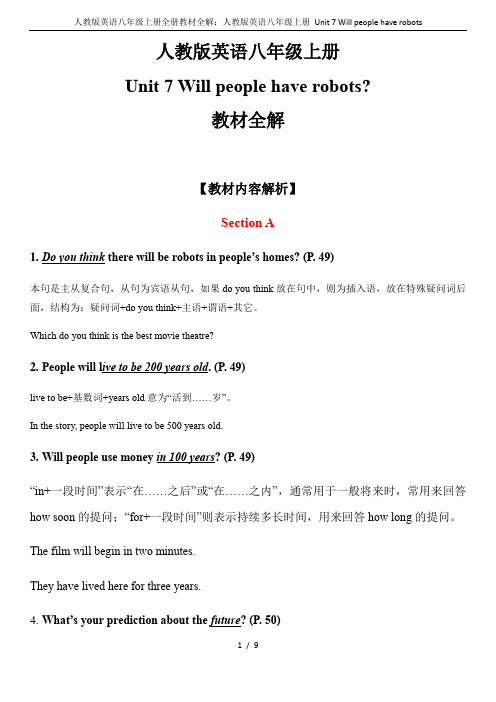
人教版英语八年级上册Unit 7 Will people have robots?教材全解【教材内容解析】Section A1.Do you think there will be robots in people’s homes? (P. 49)本句是主从复合句,从句为宾语从句,如果do you think放在句中,则为插入语,放在特殊疑问词后面,结构为:疑问词+do you think+主语+谓语+其它。
Which do you think is the best movie theatre?2.People will l ive to be 200 years old. (P. 49)live to be+基数词+years old意为“活到……岁”。
In the story, people will live to be 500 years old.3.Will people use money in 100 years? (P. 49)“in+一段时间”表示“在……之后”或“在……之内”,通常用于一般将来时,常用来回答how soon的提问;“for+一段时间”则表示持续多长时间,用来回答how long的提问。
The film will begin in two minutes.They have lived here for three years.4.What’s your prediction about the future?(P. 50)future作名词,表示“将来、未来”,in the future表示“在将来”。
Who knows what will happen in the future.5.I don’t think so.(P. 50)I don’t think so表示“我不这么认为”,肯定形式为I think so。
---Look at the cloud. It is going to rain.---I don’t think so. It will be sunny soon.【拓展】类似的结构还有:I hope so“我希望如此”,I hope not“我希望不是这样”,I’m afraid so“恐怕如此”,I’m afraid not“恐怕不是这样的”。
人教版 八年级上册 Unit 7 同步知识讲义及精选练习题(含答案)

八上Unit 7 Will people have robots?重点词汇1. 污染n. pollution --- 污染v. pollute --- 被污染的adj. polluted2. 环境n. environment --- 环境的adj. environmental3. 和平n. peace --- 和平的adj. peaceful4. 建造v. build --- 建筑物n. building5. 危险的adj. dangerous --- 危险n. danger6. 可能的adj. possible --- 可能地adv. possibly7. 相信v. believe --- 可信的adj. believable --- 不信任的adj. unbelievable8. 同意v. agree --- 同意n. agreement --- 不同意v. disagree --- 不一致n. disagreement9. 参与做某事;发挥作用play a part in doing sth.10. 多次、反复地over and over again11. 成百上千的hundreds of`12. 突然倒下;跌倒fall down13. 寻找look for14. 处于极大的危险中be in great danger15. 拯救地球save the earth16. 在乡村in the country/countryside17. 同意某人的观点agree with sb. 18. 在电脑上on computers19. 活到200岁live to be 200 years old20. 太空站space station21. 感到厌烦get bored22. 醒来wake up23. 度假take a holiday24. 更少的污染less pollution25. 让某人做某事make sb. do sth.26. 不得不做某事have to do sth.核心知识1. Do you think there will be robots in people’s homes? 你认为人们家里将会有机器人吗?(1)"Do you think...?"结构通常用来征求对方的意见或看法,后面接宾语从句,从句用陈述句语序。
八年级英语上册Unit7Willpeoplehaverobots短语语法知识点汇总新版人教新目标版

Unit 7 Will people have robots一、必背短语。
二、重点结构1.will+动词原形将要做……2.fewer/more+可数名词复数更少/更多……less/more+不可数名词更少/更多……3.have to do sth.不得不做某事(客观)must 必须(主观)4.agree with sb. 同意某人的意见5.There will be + 主语+其他将会有……=There be going to be…6.There is/are +sb./sth.+doing sth. 有……正在做某事7.make sb. do sth. 使某人做某事8.help sb. with sth. 帮助某人做某事9.What will the future be like ? 未来将会是什么样子?10.Which side do you agree with ? 你同意哪一方的观点?【教材内容解析】Section A1.Do you think there will be robots in people’s homes? (P. 49)本句是主从复合句,从句为宾语从句,如果do you think放在句中,则为插入语,放在特殊疑问词后面,结构为:疑问词+do you think+主语+谓语+其它。
例句:Which do you think is the best movie theatre?2.People will l ive to be 200 years old. (P. 49)live to be+基数词+years old意为“活到……岁”。
例句:In the story, people will live to be 500 years old.3.Will people use money in 100 years? (P. 49)“in+一段时间”表示“在……之后”或“在……之内”,通常用于一般将来时,常用来回答how soon的提问;“for+一段时间”则表示持续多长时间,用来回答how long的提问。
人教版2020年八年级英语上册Unit7Willpeoplehaverobots讲义(新版)人教新目标版

Unit 7 Will people have robots? (讲义) Words and expressionspaper /'peɪpə(r)/ n. 纸;纸张pollution /pə'luːʃn/ n. 污染;污染物prediction /prɪ'dɪkʃn/ n. 预言;预测future /'fjuːtʃə(r)/ n. 将来;未来pollute /pə'luːt/ v. 污染environment /ɪn'vaɪrənmənt/ n.环境planet/'plænɪt/ n. 行星earth /ɜː(r)θ/n. 地球;世界plant /plɑːnt/ v. 种植n. 植物part /pɑː(r)t/ n. 参加;参与;部分play a part 参与(某事)peace /piːs/ n. 和平sea /siː/ n. 海;海洋sky /skaɪ/ n. 天空astronaut /'æstrənɔːt/ n. 宇航员;航天员apartment /ə'pɑː(r)tmənt/ n. 公寓套房rocket /'rɒkɪt/ n. 火箭space /speɪs/ n. 太空;空间space station 太空站;宇宙空间站human /'hjuːmən/ adj. 人的n. 人servant /'sɜː(r)vənt/ n. 仆人dangerous /'deɪndʒərəs/ adj. 有危险的;不安全的already /ɔːl'redi/ adv.已经;早已factory /'fæktəri/ n. 工厂over and over again 多次;反复地believe /bɪ'liːv/ v.相信;认为有可能disagree /,dɪsə'griː/ v.不同意;持不同意见;有分歧even /'iːvn/ adv.甚至;连;愈加hundreds of 许多;大量shape /ʃeɪp/ n. 形状;外形fall /fɔːl/ v. (fell /fel/) 倒塌;跌倒;掉落fall down 突然倒下;跌倒;倒塌inside /ɪn'saɪd/ adv. & prep. 在……里面look for 寻找;寻求possible /'pɒsəbl/ adj. 可能存在或发生的;可能的impossible /ɪm'pɒsəbl/ adj. 不可能存在或发生的;不可能的side /saɪd/ n. 一方(的意见、态度、立场)probably /'prɒbəbli/ adv.很可能;大概during /'djʊərɪŋ/ prep. 在……期间holiday /'hɒlədeɪ/ n. 假期;假日word /wɜː(r)d/ n. 单词;词Nick /nɪk/ 尼克(男名)James /dʒeɪmz/ 詹姆斯(男名)White /waɪt/ 怀特(姓)Role-playNick: What are you reading, Jill?Jill: It’s a book about the future.Nick: Sounds cool. So what will the future be like?Jill: Well, cities will be more crowded and polluted. There will be fewer trees and the environment will be in great danger. Nick: That sounds bad! Will we have to move to other planets? Jill: Maybe. But I want to live on the earth.Nick: Me, too. Then what can we do?Jill: We can use less water and plant more trees. Everyone should play a part in saving the earth.Grammar focus’ll=willwon’t=will not3a Fill in the blanks with more, less or fewer.1.In the future, there will be fresh water because there will bepollution in the sea.2.In 100 years, there will be cars because there will bepeople in the cities.3.There will be jobs for people because robotswill do the same jobs as people.4.I think there will be cities because people will buildbuildings in the country.5.In 50 years, people will have free time because therewill be things to do.Reading2b Read the article and match each paragraph with the questionsit discusses.Paragraph 1 Will robots think like humans in thefuture? Paragraph 2 What will robots be like in the future? Paragraph 3 What can robots do today?Paragraph 4 What are robots like in movies?Do You Think You Will Have Your Own Robot?1.When we watch movies about the future, we sometimes see robots. Theyare usually like human servants. They help with the housework and do jobs like working in dirty or dangerous places.2.Today there are already robots working in factories. Some can helpto build cars, and they do simple jobs over and over again. Fewer people will do such jobs in the future because they are boring, but robots will never get bored.3.Scientists are now trying to make robots look like humans and dothe same things as we do. Some robots in Japan can walk and dance.They are fun to watch. However, some scientists believe that although we can make robots move like people, it will be difficult to make them really think like a human. For example, scientist James White thinks that robots will never be able to wake up and know where they are. But many scientists disagree with Mr. White. They think that robots will even be able to talk like humans in 25 to 50 years.4.Some scientists believe that there will be more robots in the future.However, they agree it may take hundreds of years. These new robots will have many different shapes. Some will looks like humans, and others might look like animals. In India, for example, scientists made robots that look like snakes. If buildings fall down with people inside, these snake robots can help look for people under thebuildings. This was not possible 20 years ago, but computers and rockets also seemed impossible 100 years ago. We never know what will happen in the future!Exercises一、填空1.Our (环境) will be better if we protect it.2.The (预言) didn’t come true.3.His uncle is an (宇航员).4.He worked in a (太空站) last year.5.There are five (仆人) in his family.6.Tom was surprised by all the (pollute) on the beach.7.We hope the world will be (peace).8.Be away from the tiger. It’s(danger).9.It’s too late. I (agree) that we go there today.10.It seems (possible) that people can fly.二、单选( )11. Please pass me two .A.pieces of paperB. pieces of papersC. pieces paperD. piece papers( )12. Let’s play a part the room.A. cleanB. cleaningC. to cleanD. in cleaning( )13. volunteers will give out leaflets(传单) to ask people to protect the wetlands(湿地).A. Two hundredsB. Hundreds ofC. Two hundred ofD. Hundred of( )14. , Tom! It’s time to get up and go to school.A. Wake upB. Make upC. Grow upD. Look up ()15. John will go to France on vacation this summer.A. possibleB. impossibleC. probablyD. probable( )16. It is difficult for a robot _ thesame things aperson does.A. doing; likeB. do; fromC. to do; asD. does; as( )17. —What are you doing in the room?—I’m my hat.A. looking afterB. looking forC. looking upD. looking like( )18. There are some students the classroom.A. cleanB. to cleaningC. cleaningD. cleans( )19. There are many clouds _ the sky.A. inB. onC. atD. to( )20. I think the movie is interesting. But he disagrees me.A. inB. withC. toD. of( )21. It’s7 p.m., but the children are not backyet.A. alsoB. eitherC. alreadyD. only( )22. If there are people driving, there will be _air pollution.A. less; lessB. less; fewerC. fewer; fewerD. fewer;less( )23. —Willthere be schools in the future?—I think students will study at home on the Internet.A. Yes, there will.B. No, there won’t.C. Yes, there is.D. No, there isn’t.三、翻译24.你同意将来会有更多的污染吗?Do you that there will be more pollution?25.你能告诉我未来是什么样子吗?Can you tell me what the ? 26.你必须反复地练习才能做得很好。
人教版英语八年级上册Unit7《Will people have robots_》知识点
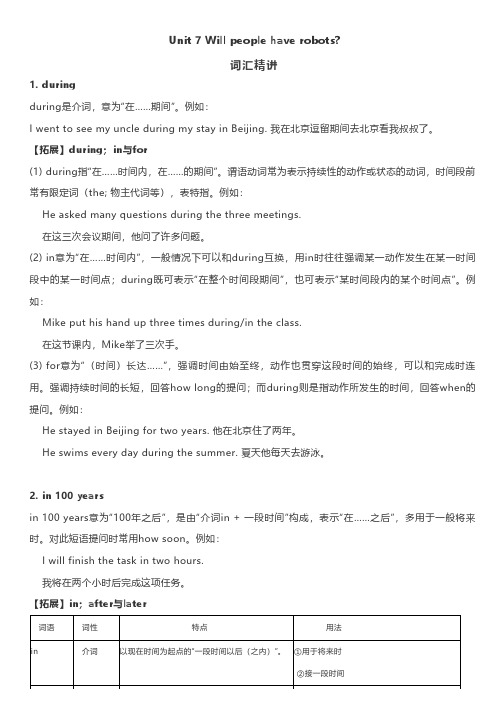
Unit 7 Will people have robots?词汇精讲1. duringduring是介词,意为“在……期间”。
例如:I went to see my uncle during my stay in Beijing. 我在北京逗留期间去北京看我叔叔了。
【拓展】during;in与for(1) during指“在……时间内,在……的期间”。
谓语动词常为表示持续性的动作或状态的动词,时间段前常有限定词(the; 物主代词等),表特指。
例如:He asked many questions during the three meetings.在这三次会议期间,他问了许多问题。
(2) in意为“在……时间内”,一般情况下可以和during互换,用in时往往强调某一动作发生在某一时间段中的某一时间点;during既可表示“在整个时间段期间”,也可表示“某时间段内的某个时间点”。
例如:Mike put his hand up three times during/in the class.在这节课内,Mike举了三次手。
(3) for意为“(时间)长达……”,强调时间由始至终,动作也贯穿这段时间的始终,可以和完成时连用。
强调持续时间的长短,回答how long的提问;而during则是指动作所发生的时间,回答when的提问。
例如:He stayed in Beijing for two years. 他在北京住了两年。
He swims every day during the summer. 夏天他每天去游泳。
2. in 100 yearsin 100 years意为“100年之后”,是由“介词in + 一段时间”构成,表示“在……之后”,多用于一般将来时。
对此短语提问时常用how soon。
例如:I will finish the task in two hours.我将在两个小时后完成这项任务。
八年级英语上册 Unit 7 Will people have robots?(第2课时)说课稿

八年级英语上册 Unit 7 Will people have robots?(第2课时)说课稿一. 教材分析《八年级英语上册》Unit 7 “Will people have robots?” 是人教版新目标英语教材的一个单元。
本单元主要围绕未来科技的发展,特别是机器人在日常生活中的应用进行讲解。
通过本单元的学习,学生可以掌握一般将来时的被动语态,提高自己的听说读写能力,并激发他们对未来科技的想象和思考。
二. 学情分析八年级的学生已经掌握了英语学习的基本语法和词汇,具备一定的听说读写能力。
他们对新科技充满好奇,善于接受新鲜事物,但同时也可能对一些抽象的概念和语言表达感到困惑。
因此,在教学过程中,我们需要关注学生的个体差异,因材施教,激发他们的学习兴趣和积极性。
三. 说教学目标根据《义务教育英语课程标准》和教材内容,本节课的教学目标如下:1.知识目标:学生能够掌握一般将来时的被动语态,理解与未来科技相关的词汇和表达。
2.能力目标:学生能够在真实情境中运用所学知识进行交流,提高听说读写能力。
3.情感目标:激发学生对未来的想象和思考,培养他们对科技发展的积极态度。
四. 说教学重难点1.教学重点:学生能够熟练运用一般将来时的被动语态进行表达。
2.教学难点:学生能够准确理解与未来科技相关的词汇和表达,以及在真实情境中运用所学知识进行交流。
五. 说教学方法与手段本节课采用任务型教学法,结合情境教学法和分组合作学习法,利用多媒体教学手段,激发学生的学习兴趣,提高他们的参与度和积极性。
六. 说教学过程1.导入:通过展示一段关于未来科技的短片,引发学生对未来的想象,激发他们的学习兴趣。
2.呈现:教师通过PPT展示本节课的主要内容,引导学生关注一般将来时的被动语态和与未来科技相关的词汇。
3.操练:学生分组进行角色扮演,运用所学知识进行对话,教师给予指导和反馈。
4.巩固:学生完成一组有关未来科技的练习题,检测他们对知识的掌握程度。
八年级英语上册Unit7Willpeoplehaverobots知识点总结全面整理(带答案)

八年级英语上册Unit7Willpeoplehaverobots知识点总结全面整理单选题1、There ________ a football match this evening. Let’s go and watch it.A.are going to beB.wasC.will beD.were答案:C句意:今晚有一场足球赛。
我们去看吧。
考查there be句型的时态。
根据语境是there be句型,根据时间状语this evening可知,此处是there be的一般将来时,排除BD;其结构是There will be+主语+介词短语或There is/are going to be+主语+介词短语,主语是a football match,排除A。
故选C。
2、—I don't think sixteen-year-olds should be allowed to drive.—________! They are too young.A.I agreeB.It's a pityC.Good luck答案:A句意:——我认为不应该允许16岁的青少年开车。
——我赞同!他们太年轻了。
考查情景交际。
I agree我赞同;It's a pity真遗憾;Good luck祝你好运。
根据答句中“They are too young.”可知是赞同对方的想法,用I agree符合题意。
故选A。
3、To ________ the river means to make the river dirty.A.protectB.polluteC.provide答案:B句意:污染河流意味着河流会变脏。
考查动词词义辨析。
protect 保护;防护;pollute 污染;provide 提供;供应。
由“make the river dirty”可知此空应填污染。
故选B。
4、Could I use your dictionary? I need to _________ the new words.A.pick upB.look upC.clean upD.give up答案:B句意:我能用一下你的词典吗?我需要查一些生词。
人教版英语八年级上册全册教材全解: Unit 7 Will people have robots
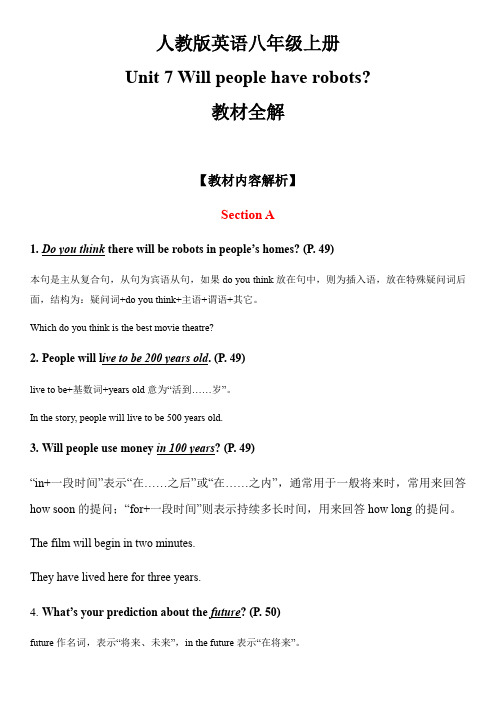
人教版英语八年级上册Unit 7 Will people have robots?教材全解【教材内容解析】Section A1.Do you think there will be robots in people’s homes? (P. 49)本句是主从复合句,从句为宾语从句,如果do you think放在句中,则为插入语,放在特殊疑问词后面,结构为:疑问词+do you think+主语+谓语+其它。
Which do you think is the best movie theatre?2.People will l ive to be 200 years old. (P. 49)live to be+基数词+years old意为“活到……岁”。
In the story, people will live to be 500 years old.3.Will people use money in 100 years? (P. 49)“in+一段时间”表示“在……之后”或“在……之内”,通常用于一般将来时,常用来回答how soon的提问;“for+一段时间”则表示持续多长时间,用来回答how long的提问。
The film will begin in two minutes.They have lived here for three years.4.What’s your prediction about the future?(P. 50)future作名词,表示“将来、未来”,in the future表示“在将来”。
Who knows what will happen in the future.5.I don’t think so.(P. 50)I don’t think so表示“我不这么认为”,肯定形式为I think so。
---Look at the cloud. It is going to rain.---I don’t think so. It will be sunny soon.【拓展】类似的结构还有:I hope so“我希望如此”,I hope not“我希望不是这样”,I’m afraid so“恐怕如此”,I’m afraid not“恐怕不是这样的”。
英语人教版八年级上册Unit-7-Will-people-have-robots
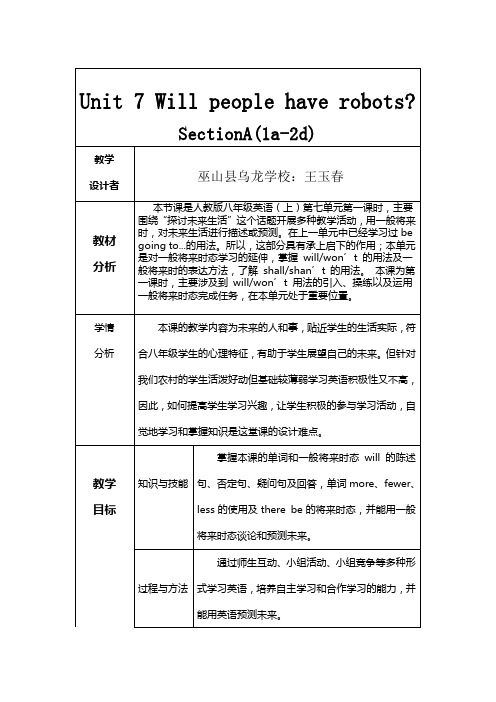
Yes,…will./No,…won’t.
There will/won’t be( more/fewer/less)…
小组评价
教
学
后
记
该教学设计非常贴近学生的生活实际,条理清晰。在引入和课程进行中充分考虑到学生对英语学习感兴趣不浓,运用了许多更直观,更引人入胜的设计,让学生在游戏中巩固新知识,激发学生的学习兴趣使学生乐于学习、乐于探究。在教学过程的设计中充分体现了老师引导,学生自主学习和合作探究学习的观点。设计过程详细但又不受书本内容的局限,把听力归纳在一起来,让学生集中练习。在教学活动中通过预测地球进行德育教育的渗透,增强环保意识。在重点语法教学方面,采用给出实例,让学生归纳总结的方法,不仅教给学生本课的重要语法,同样也交给学生自学的有效方法。
过程与方法
通过师生互动、小组活动、小组竞争等多种形式学习英语,培养自主学习和合作学习的能力,并
能用英语预测未来。
情感态度与价值观
培养合作意识和集体荣誉感,增强环保意识。
教学重点
学习will一般将来时态的构成方式。
单词more、fewer、less的用法,能熟练运用一般将来时态
预测未来。
教学难点
用will一般将来时态表达未来。
Step7.Exercise and homework.
设计理念:复习巩固本堂课所学的知识。
板
书
设
计
Unit 7 Will people have robots? --- Section A
一般将来时:will
1.肯定句:主+will +V(原形)+其他.
2.否定句:主+won’t +V(原形)+其他.
unit_7_Will_people_have_robots知识点总结
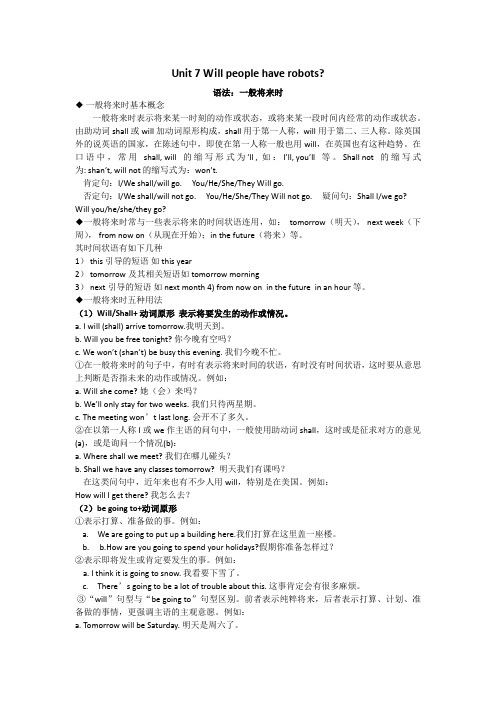
Unit 7 Will people have robots?语法:一般将来时◆一般将来时基本概念一般将来时表示将来某一时刻的动作或状态,或将来某一段时间内经常的动作或状态。
由助动词shall或will加动词原形构成,shall 用于第一人称,will用于第二、三人称。
除英国外的说英语的国家,在陈述句中,即使在第一人称一般也用will,在英国也有这种趋势。
在口语中,常用shall, will的缩写形式为’l l , 如:I’ll, you’ll等。
Shall not的缩写式为: shan’t, will not 的缩写式为:won’t.肯定句:I/We shall/will go. You/He/She/They Will go.否定句:I/We shall/will not go. You/He/She/They Will not go. 疑问句:Shall I/we go? Will you/he/she/they go?◆一般将来时常与一些表示将来的时间状语连用,如: tomorrow(明天), next week(下周), from now on(从现在开始);in the future(将来)等。
其时间状语有如下几种1)this引导的短语如 this year2)tomorrow及其相关短语如tomorrow morning3)next引导的短语如 next month 4) from now on in the future in an hour 等。
◆一般将来时五种用法(1)Will/Shall+ 动词原形表示将要发生的动作或情况。
a. I will (shall) arrive tomorrow.我明天到。
b. Will you be free tonight? 你今晚有空吗?c. We won’t (shan’t) be busy this evening. 我们今晚不忙。
①在一般将来时的句子中,有时有表示将来时间的状语,有时没有时间状语,这时要从意思上判断是否指未来的动作或情况。
八年级英语上册《Unit7Willpeoplehaverobots》的知识点归纳
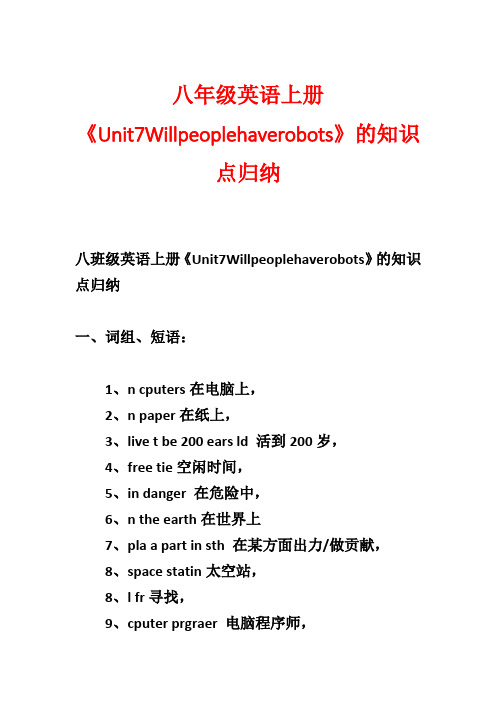
八年级英语上册《Unit7Willpeoplehaverobots》的知识点归纳八班级英语上册《Unit7Willpeoplehaverobots》的知识点归纳一、词组、短语:1、n cputers在电脑上,2、n paper在纸上,3、live t be 200 ears ld 活到200岁,4、free tie空闲时间,5、in danger 在危险中,6、n the earth在世界上7、pla a part in sth 在某方面出力/做贡献,8、space statin太空站,8、l fr寻找,9、cputer prgraer 电脑程序师,10、in the future 在将来,11、hundreds f成百上千的.,12、the sae…as与…一样,13、ver and ver again 反复,14、get bred 无聊,abe/perhaps 用于句首。
Mabe/Perhaps u are right.1. during / fr / in 介词,在……期间。
说到某事是在某一段时间之间发生的用during; 说到某事持续多久则用fr; 说到某事具体发生的时间用in.We visited an places f interest during the suer hlida.I’ve been here fr tw we es.The usuall leave schl in ul.一般将来时结构:肯定式:主语+ will/shall + 动词原形+ 其他will 用于各种人称,shall 用于第一人称。
主语+ be ging t + 动词原形+ 其他be 随人称、数和时间的变化而变换。
否定式:在will/shall/be 后面加nt. will nt = wn’t .一般疑问句:将will/shall/be 提到主语前面。
There be 句型的一般将来时:There will be + 主语+ 其他,意为:将会有。
八年级英语上册unit7willpeoplehaverobots知识点+练习
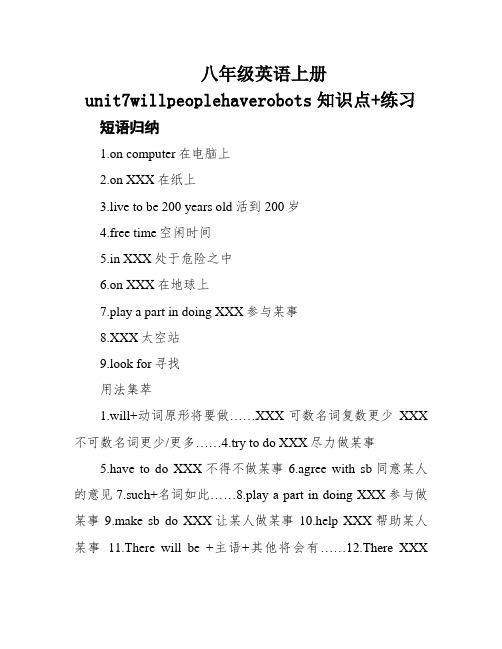
八年级英语上册unit7willpeoplehaverobots知识点+练习短语归纳1.on computer在电脑上2.on XXX在纸上3.live to be 200 years old活到200岁4.free time空闲时间5.in XXX处于危险之中6.on XXX在地球上7.play a part in doing XXX参与某事8.XXX太空站9.look for寻找用法集萃1.will+动词原形将要做……XXX可数名词复数更少XXX 不可数名词更少/更多……4.try to do XXX尽力做某事5.have to do XXX不得不做某事6.agree with sb同意某人的意见7.such+名词如此……8.play a part in doing XXX参与做某事9.make sb do XXX让某人做某事10.help XXX帮助某人某事11.There will be +主语+其他将会有……12.There XXX有……正在做某事13.It is +形容词+for sb +to do XXX做某事对某人来说是怎样的14.XXX.It takes sb some time/money to do XXX“曾经”,通经常使用于肯定句16.hundreds of许多、大量,与具体数字连用时,用单数且不与of连用。
如:five XXX。
n。
XXX与其用法相同17.XXX透露表现信赖或人说的话XXX信赖或人的为人18.et to do XXX遗忘去做某事XXX遗忘做了某事重点句子:1.They are usually like human servants.他们就像是人类的仆人。
2.They help with the housework and do jobs like working in dirty or dangerous places.他们协助做家务及一些在比力脏或风险的中央工作的工作。
河南省八年级英语上册Unit7Willpeoplehaverobots知识点总结(超全)

河南省八年级英语上册Unit7Willpeoplehaverobots知识点总结(超全)单选题1、There will be _______ jobs for people because some robots will do the same jobs as people. A.manyB.moreC.fewerD.fewest答案:C句意:将会有更少的工作给人们,因为有一些机器人将做和人们一样的工作。
A. many许多,修饰可数名词复数;B. more 更多;C. fewer 更少;D. fewest最少。
根据some robots will do the same jobs as people可知机器人做了人们的工作,因此人们做的工作就更少了。
故选C。
2、---It’s reported that Chinese ___________more than 40 minutes a day reading WeChat(微信).---It’s true. But I think WeChat is taking too much of our time.A.spendB.costC.payD.take答案:A试题分析:句意:——据报道中国人一天花费四十多分钟读微信。
——这是真的。
但是我认为微信花费我们太多的时间。
Sb spend some time doing sth某人花费时间做某事; sth cost sb some money某物花费某人一些钱; sb pay some money for sth某人花费钱买某物; It takes sb some time to do sth做某事花费某人一些时间。
根据宾语是reading Wechat可知此处的谓语用spend。
故选A。
考点:考查动词词义辨析的用法。
3、—Tina wants to know if you ________ to the park with us tomorrow.—I’d love to. But if it ________, I may go to the library instead.A.go; will rainB.go; rainsC.will go; rainsD.will go; will rain答案:C句意:——Tina想知道你明天是否和我们一起去公园。
- 1、下载文档前请自行甄别文档内容的完整性,平台不提供额外的编辑、内容补充、找答案等附加服务。
- 2、"仅部分预览"的文档,不可在线预览部分如存在完整性等问题,可反馈申请退款(可完整预览的文档不适用该条件!)。
- 3、如文档侵犯您的权益,请联系客服反馈,我们会尽快为您处理(人工客服工作时间:9:00-18:30)。
八上Unit 1 Will people have robots?Period One (Section A 1a-2c)班级:_________ 姓名: _______使用时间:_________________学习目标:New words: will, robot, everything, paperKey phrases: on computers, on paper, live to be…,in 100 years, less pollution, fewer treesKey sentences: ⑴Kids will study at home on computers.⑵Kids won’t go to school.⑶—Will people have robots? —Yes, they will. /No, they won’t.⑷—Will there be less pollution? —Yes, there will. /No, there won’t.学习重难点:重点:由will构成的一般将来时态的句式。
难点:1.more,less,fewer的用法。
2.there be 句式的一般将来时态there will be…学习过程:一. 创设情境,激情导入T: Do you like to do housework?/ Do you want to wash the dirty dishes?/ Do you like to wash clothes? Now maybe some useful invention can help us do these things. Do you know what it is?二. 自主学习,自我提高1.个人自读,记忆本课单词。
2.小组互相检查单词读写情况A英汉互译并展示1.污染___________2.空闲时间__________3免费的______4.on computers____________5.活到200岁_______________6.in 100 years_______________6. 将有______________展示交流:Activity 1a Check A or D.语法小结:一般将来时1)一般将来时由―助动词will+动词原形‖构成,表示将来某个时间要发生的动作或存在的状态,常与表示将来的时间状语连用,如:tomorrow,next week,next year,in the future等。
例如:(1)We will come to see you next week.(2)--Will people use money in 100 years?--Yes,thet will./--No,they won’t.(3)How will the world be different in the future?三.合作探究,共同提高Activity 1b & 1c Listen and speak1.听录音,完成1b,教师核对答案2.Pair-work.两人一组针对1a中的预言进行问答,并展示。
3.Activity 2a&2b. Listening and check the answer.4.根据2a和2b的预测编对话知识拓展: (1)There be句型:构成:肯定句:There be+某人/某物+地点/否定句:There be +not, some改any,(not any可以换成no)/一般疑问句;be提前,some改anythere be 接词要运用就近原则.a. There____ a book and two rulers on the desk.b. There ____ two rulers and a book on the desk.There be 句型有时态的变化a. 一般现在时:There is/are…b. 一般过去时:There was/were…c. 一般将来时:There will be…/ There is/ar e going to be…(2)Books will only be on computers, not on paper. 书只会在电脑上,而不会在纸上。
paper n. 纸;纸张,是不可数名词。
表示―一张纸‖用a piece of paper; ―两张纸‖用two pieces of paper。
桌子上有一张纸。
__________________________________ .paper n. 试卷,作可数名词,有复数形式。
我丢了一份历史试卷。
______________________________ .(3)There will be fewer people. 将有更少的人。
本句是含有there be句型的一般将来时的简单句。
结构为:There will be + 主语+其他。
其否定形式是在will 后加not;疑问句形式是把will 提到there前。
简略肯定回答:Yes, there will. 简略否定回答:No, there won’t.四.成果展示,课堂小结五.检测反馈,巩固提高A.根据句意及首字母提示补全所缺单词:1. People will have r_______ in their homes.2. E__________ will be free in the future.3. Please write down your name on this piece of p__________.4. There is a bird singing in the t________.5. I have f_______ books than Tom.B.单项选择1. I think there will be_____ people and ____pollution in the future.A. less, fewB. few , lessC. more, more2. There____a football match tomorrow.A.is going to haveB. will haveC. will be3.There_____an English party in our school this evening.A. will haveB.is havingC.is going to be4.Be quick! There is_____ time left. A. little B. a little C. few5. I will be a doctor____10 years. A. after B. later C.in学后反思:Unit 1 Will people have robots?Period Two (Section A 2d-3c)班级:_________ 姓名: _______使用时间:_________________学习目标:New words: buildingKey phrase: in college, in five years, in the future, move to a placeKey sentences: I think there will be more tall buildings.What do you think Sally will be in five years?I think she’ll be a doctor学习重难点:一般过去时、一般现在时和一般将来时的运用学习过程:一. 创设情境,激情导入二. 自主学习,自我提高A..个人自读,记忆本节课单词。
B.预习2d-3cC.预习检测听起来好酷______________处于极大的危险中_____________________搬到其他的星球上去______________________住在地球上________________ 参加做某事_____________________在家里用电脑学习__________________ 根据句子意思用所给的词的正确形式填空1. I often______ up at 6:00 in the morning, but tomorrow morning I______________up at 7:00 (get).2. My father_______ a teacher in 10 years ago, but now he____ a policeman. (be)3. Many people in our village _______a lot of tall_____ last year. (build)4. Last Friday night, I_________(have) a birthday party at home.5. There______________(not be) an English test the day after tomorrow.三,合作探究,共同提高任务1:分角色表演2d对话,并熟读背诵。
语言点导学:1) I think there will be more/less pollution.There will be more/fewer trees.less是_________的比较级,修饰_________(可数/不可数名词)fewer是________的比较级, 修饰_________(可数/不可数名词)_________是much和many的比较级,修饰可数名词和不可数名词任务2:两人一组,熟读并背诵Grammar focus 内容,讨论一般将来时的各种句型任务3:完成3a,3b.II. 轻松选择( )1. Five years ago, Li Mei______ soccer. A. plays B. played C. will play()2. _____ more buildings in our school in the future.A. There areB. There wereC. There will be()3. Her grandmother lived_________103 years old. A.to B.be C. to be ()4.—_____________ will Mary’s cousin come back from Shanghai?—In a week. A. How long B. How often C. How soon( )ually Mike spends___________ time doing homework than Jack.A .little B. fewer C. less四,成果展示,课堂小结。
